Marrakech’s cultural heritage stands as a testament to its historical significance and architectural splendor. Founded in the 11th century, the city thrived as a trade center, fostering diverse cultural exchanges. The Medina’s winding alleys reveal gems like the Koutoubia Mosque and the Saadian Tombs, each narrating tales of craftsmanship and devotion. Traditional Moroccan cuisine tantalizes the senses, while vibrant festivals breathe life into the city. Yet, beneath this rich tapestry lies a deeper narrative of influence and adaptation that shapes modern Marrakech. What secrets might the city’s past still hold for those willing to explore?
Good To Know
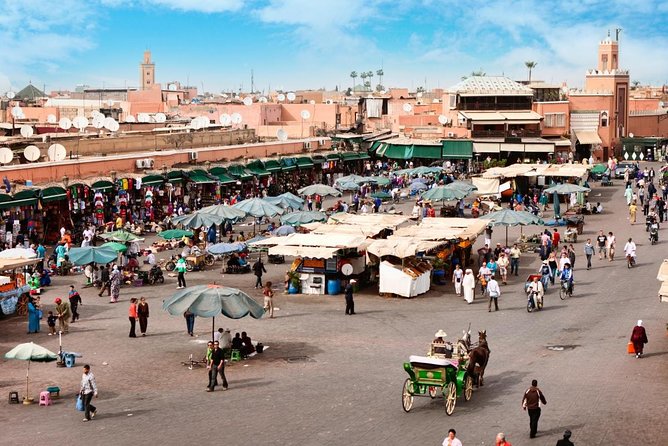
- Marrakech’s historical significance as a trade hub facilitated cultural exchanges and architectural development, evident in its labyrinthine Medina streets.
- UNESCO World Heritage Sites, including Jemaa el-Fnaa Square and Koutoubia Mosque, showcase the city’s rich cultural identity and architectural brilliance.
- Traditional Moroccan cuisine, featuring dishes like tagine and couscous, reflects the city’s culinary heritage and local hospitality.
- Festivals such as the Marrakech Popular Arts Festival celebrate the city’s vibrant arts, music, and cultural traditions.
- Local artisans contribute to Marrakech’s cultural heritage through intricate crafts, fostering appreciation for traditional techniques and supporting the community’s economy.
Historical Significance of Marrakech
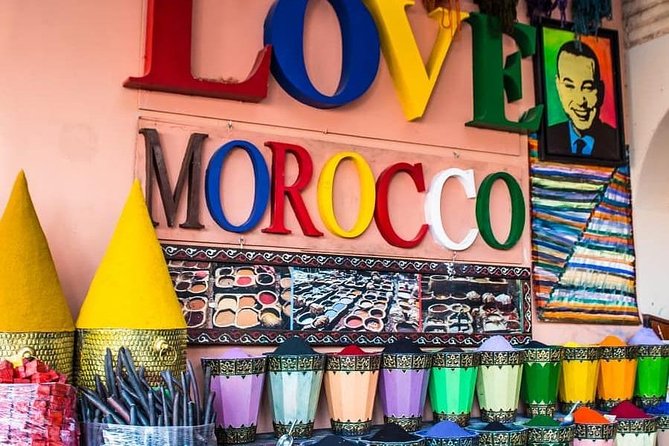
Marrakech stands as a testament to Morocco’s rich historical tapestry, showcasing a blend of Berber, Arab, and French influences. Founded in 1062, the city quickly became a vital trade hub, connecting sub-Saharan Africa to Europe.
Its strategic location facilitated cultural exchanges, leading to the hotel of exquisite architecture and vibrant markets. The city’s medina, with its labyrinthine streets, reflects centuries of history, where traditional craftsmanship thrives.
Notable landmarks, like the Koutoubia Mosque and the Saadian Tombs, reveal the grandeur of past dynasties. Marrakech’s historical significance also lies in its role as a center of learning and spirituality, fostering intellectual development throughout the ages.
Today, these elements coalesce, making Marrakech a captivating destination for those seeking to understand its storied past.
You can also read our reviews of more tours and experiences in Marrakech.
UNESCO World Heritage Sites
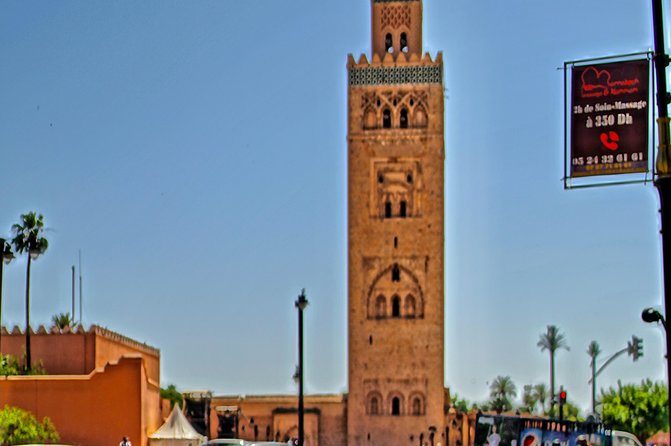
Recognized for its rich historical significance, Marrakech is home to several UNESCO World Heritage Sites that highlight its cultural and architectural legacy.
The iconic Jemaa el-Fnaa Square serves as the city’s vibrant heart, bustling with storytellers, musicians, and vendors. Nearby, the stunning Koutoubia Mosque, with its impressive minaret, stands as a testament to the city’s Islamic heritage.
The intricate designs and historical importance of the 16th-century Medina reflect the city’s architectural brilliance. Plus, the renowned Merdersa Ben Youssef showcases exquisite craftsmanship and educational history.
Together, these sites draw visitors from around the globe, offering a glimpse into Marrakech’s past while preserving its unique identity. Each location invites exploration and appreciation of the city’s enduring cultural richness.
Architectural Marvels
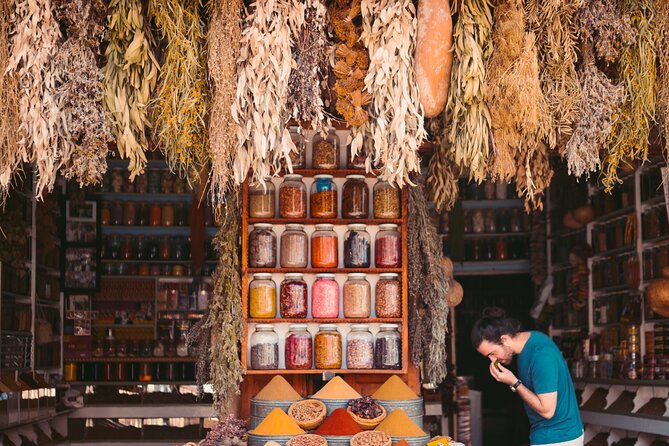
The architectural marvels of Marrakech reflect a harmonious blend of history, culture, and artistry that captivates both locals and visitors alike.
Each structure tells a story, showcasing the city’s rich heritage. Notable examples include:
-
Koutoubia Mosque – The iconic minaret stands tall, symbolizing the city’s spiritual heart.
-
Bahia Palace – A stunning example of 19th-century architecture, adorned with intricate tile work and lush gardens.
-
Saadian Tombs – These ornate mausoleums showcase exquisite craftsmanship from the Saadian dynasty.
-
Madrasa Ben Youssef – A former Islamic school, known for its beautiful zellij tile and elaborate woodwork.
Together, these architectural gems create a tapestry of Marrakech’s vibrant history, inviting exploration and admiration.
Traditional Moroccan Cuisine
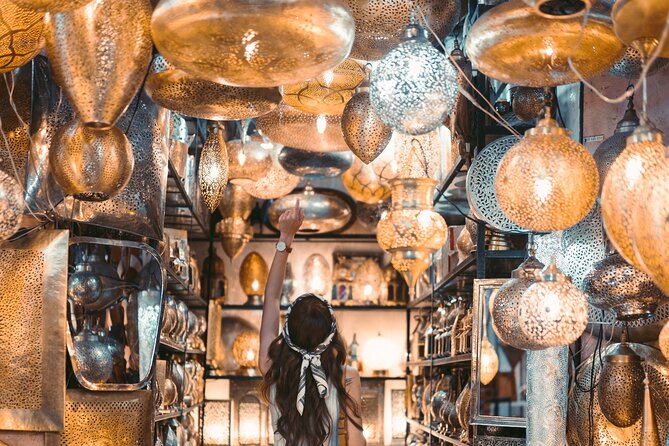
Flavors of Morocco tantalize the senses, creating a culinary experience that reflects the country’s rich cultural tapestry.
Traditional Moroccan cuisine is a vibrant blend of spices, fresh ingredients, and diverse influences. Dishes like tagine, slow-cooked to perfection, showcase the harmony of flavors, while couscous serves as a staple, often accompanied by meats and vegetables.
Street vendors entice with their offerings of grilled kebabs and savory pastries, each bite revealing the depth of local traditions. Mint tea, served with ceremony, symbolizes hospitality and friendship.
Markets overflow with colorful spices like saffron and cumin, inviting exploration. In Marrakesh, every meal tells a story, connecting diners to the region’s history and its people, ensuring that the culinary heritage remains alive and celebrated.
Cultural Festivals and Events

Marrakesh pulses with life, especially during its vibrant cultural festivals and events that celebrate the city’s rich heritage.
These gatherings attract locals and travelers alike, showcasing the dynamic spirit of the city. Key festivals include:
- Marrakech Popular Arts Festival – A celebration of traditional music, dance, and crafts.
- Marrakech International Film Festival – A prestigious event highlighting global cinema and filmmakers.
- Gnaoua World Music Festival – A fusion of African, Berber, and Arab musical traditions.
- Marrakech Food Festival – A culinary extravaganza that showcases Morocco’s delicious cuisine.
These events not only entertain but also educate attendees about Marrakesh’s diverse cultural landscape, enriching their understanding of Moroccan traditions and community spirit.
- 3 Day Trek in the Atlas Mountains and Berber Villages From Marrakech
- Atlas Mountains & Berber Villages& Cultuer Waterfalls Day Trip
- Atlas Mountains & 3 Valleys Private Tour From Marrakech
- 2-Day Zagora Tour From Marrakech Including the Atlas Mountains, Camel Trek and Desert Camp
- The 10 Tastings of Marrakech With Locals: Private Food Tour
- Marrakesh: Agafay Desert Sunset, Camel Ride, Dinner and Show
Local Arts and Crafts
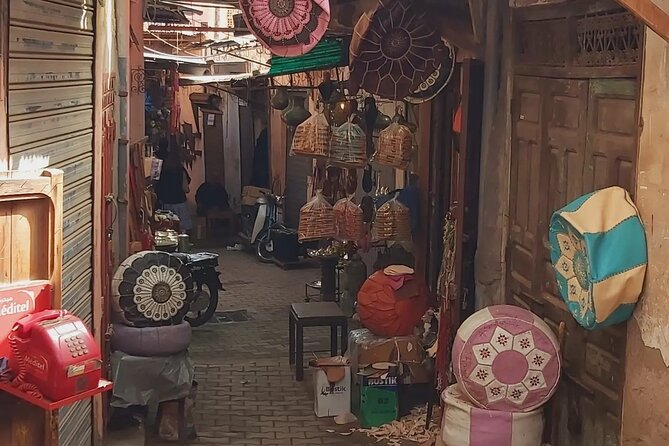
Craftsmanship thrives in the vibrant streets of Marrakesh, where artisans skillfully create a stunning array of local arts and crafts.
Visitors can find intricate pottery, vibrant textiles, and hand-carved wooden furniture that reflect the city’s rich heritage. Each piece tells a story, showcasing the unique techniques passed down through generations.
The bustling souks, alive with color and creativity, offer everything from delicate metalwork to beautifully woven rugs. Artisans often invite onlookers to witness their process, fostering a deep appreciation for their craft.
Handcrafted goods not only serve as souvenirs but also as a bridge connecting visitors to Marrakesh’s cultural essence. Supporting these local artisans helps preserve traditional methods while enriching the community’s economic landscape.
Influence of Islamic Culture
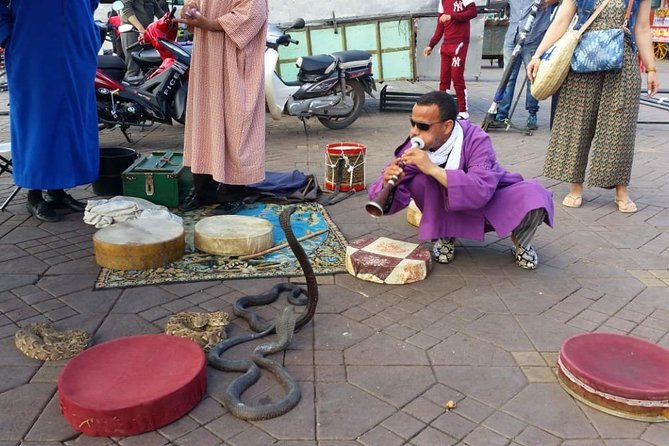
The vibrant arts and crafts scene in Marrakesh is deeply intertwined with the city’s Islamic cultural heritage. This influence manifests in various aspects, shaping the identity and beauty of the city.
-
Architecture: Intricate tile work and stunning minarets showcase Islamic design principles.
-
Calligraphy: Elegant Arabic script adorns many buildings, reflecting the spiritual essence of Islamic teachings.
-
Textiles: Traditional patterns and motifs found in carpets and fabrics often tell stories from Islamic history.
-
Ceramics: Colorful pottery features geometric designs, symbolizing the harmony and balance valued in Islamic art.
Together, these elements create a unique cultural tapestry, making Marrakesh a living testament to the enduring legacy of Islamic culture.
Modern-Day Marrakech Experience
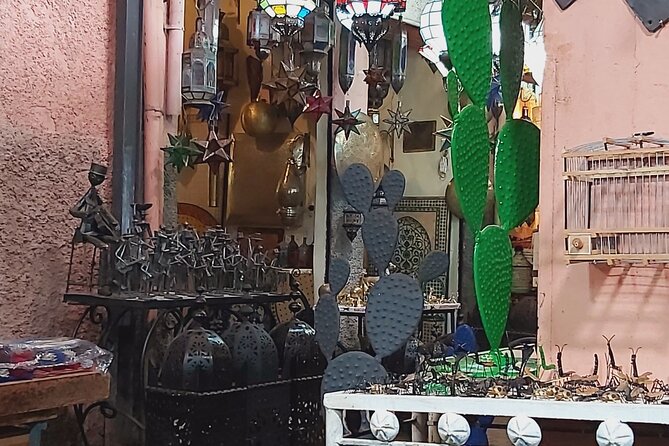
While exploring the vibrant streets of Marrakech, visitors encounter a city that seamlessly blends tradition with modernity. From bustling souks to chic boutiques, Marrakech offers a unique experience. Tourists can engage with local artisans, savor exquisite Moroccan cuisine, and enjoy the rich history and culture that permeates the city.
| Experience Type | Highlights |
|---|---|
| Cultural Tours | UNESCO sites, local markets |
| Culinary Adventures | Cooking classes, street food |
| Relaxation Spots | Spas, gardens, rooftop cafés |
This dynamic atmosphere captivates travelers, inviting them to discover hidden gems and enjoy the luxurious amenities available. Marrakech’s modern-day charm lies in its ability to honor its past while embracing innovation.
Frequently Asked Questions
What Are the Best Times to Visit Marrakech for Cultural Experiences?
The best times to visit Marrakech for cultural experiences are spring and fall. During these seasons, the weather’s pleasant, local festivals abound, and travelers can fully enjoy the city’s vibrant atmosphere and rich traditions.
Are There Guided Tours Available for Exploring Marrakech’s Heritage Sites?
Yes, guided tours are available for exploring Marrakech’s heritage sites. Travelers can enjoy private tours that feature expert guides, highlight historical landmarks, and offer insights into the local culture, making their experience both enriching and memorable.
To navigate Marrakech’s bustling streets and vibrant markets, travelers should carry a map, embrace local customs, and engage with friendly locals. They’ll find winding alleys lead to hidden gems and authentic experiences waiting to be discovered.
What Should I Wear to Respect Local Customs While Visiting?
When visiting, he recommends wearing loose-fitting, modest clothing to respect local customs. Lightweight fabrics help with the heat, while a scarf can provide coverage in religious sites, ensuring a respectful and enjoyable experience.
Are There Any Local Etiquette Tips for Interacting With Residents?
When interacting with residents, he should greet warmly, use polite phrases, and show appreciation for their hospitality. Avoiding sensitive topics and respecting personal space will foster positive connections and enhance his experience in the community.
The Sum Up
Marrakech’s cultural heritage is a vibrant blend of history, architecture, and tradition that continues to captivate visitors. Its UNESCO World Heritage Sites, stunning mosques, and rich culinary offerings reflect a deep-rooted identity shaped by centuries of cultural exchange. The city’s lively festivals and skilled artisans showcase the enduring influence of Islamic culture. Today, Marrakech stands as a dynamic testament to its past, inviting all to explore and experience the unique charm that defines this enchanting city.
More Historical Tours in Marrakech
- 9 Days Southern Oasis, Kasbahs & Desert Morocco Cultural Tour From Marrakech
- The Jewish Heritage in Marrakech
- Historical and Cultural Tour of Marrakech
- 10-Day Private Cultural Tour of the Imperial Cities of Morocco
- Enchanting Half-Day Journey of Marrakech Into History & Culture.
- Echoes of History: Journey Through Marrakeshs Treasures
More Tour Reviews in Marrakech
- Marrakesh: Early Morning 40-Minute Balloon Flight
- Royal Ritual: Hammam, Massage, Facial & Foot Care of Royalty
- Buggy Tour in Agafay Desert
- 9 Days Private Round Trip From Tangier via Fez, Merzouga Desert & Marrakech
- 5-Day Private Desert Tour From Marrakech
- 5 Day Locally Immersive Mountain Trek | Through Villages in Atlas Mountain
Not for you? Here's more nearby things to do in Marrakech we have reviewed
- Marrakesh: Early Morning 40-Minute Balloon Flight
- Royal Ritual: Hammam, Massage, Facial & Foot Care of Royalty
- Buggy Tour in Agafay Desert
- 9 Days Private Round Trip From Tangier via Fez, Merzouga Desert & Marrakech
- 5-Day Private Desert Tour From Marrakech
- 5 Day Locally Immersive Mountain Trek | Through Villages in Atlas Mountain
- Private Tour of Atlas Mountains and Three Valleys From Marrakech
- From Marakkesh: Half Day Buggy Adventure in Agafay Desert
- Marrakech To Ouzoud Waterfalls All Exclusive Day Trip
- Desert Agafay and Atlas Mountains Waterfall & Camel Ride Day Trip From Marrakech
- Half-Day Quad Bike Experience in Marrakech
- 9 Days Southern Oasis, Kasbahs & Desert Morocco Cultural Tour From Marrakech
